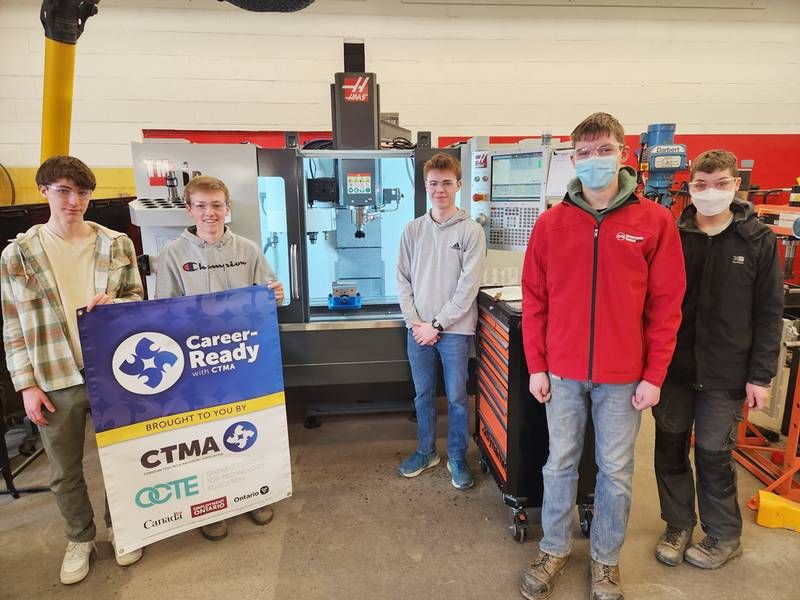Kelli McRobert | Apr 12, 2023
Sydenham High School has been offering Grade 11 & 12 students the opportunity to explore various trades while still in school for many years. The programs themselves continue to evolve and the provincial government has recently announced funding to deliver new advanced machinery to 40 high schools.
In collaboration with the Canadian Tooling & Machining Association (CTMA) and the Ontario Council for Technology Education (OCTE), 22 district school boards will acquire new machinery and offer students certification training to support their career aspirations. The Career-Ready with CTMA: Expanding Opportunities program has been well received, and to date, students have been eager to participate and explore a variety of trades and precision skills.
In the past, schools offered a variety of courses including Automotive, Metal Shop, and Wood Working. However, with the new equipment and funding more intensive programs and specialities are being developed. Students can opt for co-op work placements and work alongside experienced tradespeople, and professionals. Once they complete the program, their diploma is distinguished from the rest with a red seal, certifying their learned and assessed skills and abilities within a specific sector.
The ‘major tech’ credits in the Specialist High Skilled Major (SHSM) program help establish a background in a specified manufacturing sector and students can explore their various passions and skills in a safe and informative environment.
Sydenham is one of only two schools in the Lanark-Frontenac-Kingston provincial riding, along with Carleton Place High School, that are receiving a CNC milling machine courtesy of the CTMA. CNC (Computerised Numerical Control) machines which can be pre-programmed to do complex work.
The SHS students work closely with the instructor to understand the design and programming elements of this high-tech machine.
The CTMA noted in their press release that their “goal is to expose high school students to technology at an earlier age to engage their interest for a career within our industry,” said Robert Cattle, CTMA executive director. “Not only does this expose students to newer technology at an earlier age, but also gives teachers up-to-date equipment to implement in their classroom.” The machines vary and include CNC milling centres, and plasma cutters, to CNC desktop milling machines, high precision conventional milling machines and lathes with readouts. Each school will also receive tool kits and cutting tools, to help support their program, as noted on the press release.
The OCTE past chair, Dave Lewis, noted that “this exciting partnership is providing much-needed support for our manufacturing technology high school programs and will go a long way in reducing the skilled trades gap in this important industry.” There is also an incentive for employers to support this training as they could receive a wage subsidy of 50% of wages paid, up to $5000.00 per student placement.
Along with the hands-on training, Limestone District students are provided the opportunity to certify online in various certification courses and sessions, that offer them a step up when seeking employment. Other areas are Hospitality & Tourism, where students can participate in the food service industry in their local cafeteria, gaining valuable experience in safe food handling, customer service, and costing.
Brian Moelker, Department Head of Technology and Co-op, said that he currently has 30 students enrolled in the program, and he is working hard to continue to add elements to the training that directly support the students as they move into the ever-changing workforce. He explained that many move into apprenticeship roles and continue learning through Northern College, St Lawrence College, and Loyalist College, to name but a few. He hopes to continue to build the already successful program to inspire students to investigate a trade they may not have initially considered.
It is expected that their will be a future labour shortage in the province with some estimates claiming 100,000 unfilled jobs. Moelker hopes to reduce that scarcity as best he can, one student at a time.
For SHS students, attending a school that is ahead of the curve when it comes to tech skills is an advantage over their peers in other schools. The recent announcement by the Ontario Ministry of Education regarding mandatory tech credits, reinforces how important this type of training is for local youth to excel in a field that continues to require skilled tradespeople.
“By requiring students to take at least one technological education credit in high school, we are opening up doors and creating new pathways to good jobs in STEM [Science, Technology, Engineering, and Math] and the skilled trades,” said Minister of Education Stephen Lecce recently.
The mandatory shop class credit will start with students who enter Grade 9 in 2024. Students will need a Grade 9 or 10 credit in one of the following: communications technology, computer technology, construction technology, green industries, hairstyling and esthetics, health care, hospitality and tourism, manufacturing technology, technological design, or transportation technology.
More Stories
- Dry Conditions Spark Fires in Fields and Forests
- 143rd Maberly Fair
- Local Seniors Medal at OSGA 55+ Provincial Games
- Seventh Town Serenades Sharbot Lake
- Brass Point Bridge Closure Leaves Commuters Behind
- Wild Art Walk Call For Submissions
- Three Dwelling Limit Coming For Lots in North Frontenac
- Wildfire in the 1000 block of Rutledge Road - Township Says Fire Now "Under Control"
- Verona and Sydenham Ballpayers Win National Championship With Kingston Colts
- Sweet Music and Some hard Truths At Blue Skies MusicFestival

